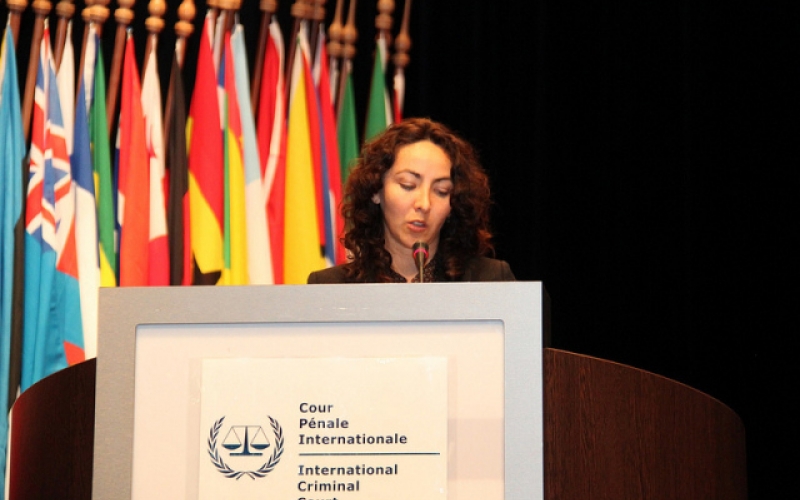Working for an effective Rome Statute system in Latin America

The importance of civil society groups´ engagement in the different stages of the life of the ICC has always been recognized by governments, ICC officials, scholars, and different victims´ groups.
NGOs were key players prior to, during, and after the Rome Conference. This role was arguably confirmed during and after the Review Conference in Kampala, allowing us to acknowledge that part of the progress made so far by States Parties to the Rome Statute of the ICC regarding the ratification of the Kampala amendments is also a result of civil society efforts.
Different NGOs from all over the world, originally convened by the NGO Coalition for the ICC (today the Coalition for the ICC), have been working together for almost two decades to achieve a common goal: having an effective and independent international court that is able to address the impunity surrounding the most serious crimes of international concern.
Civil society groups first worked to get the approval of the ICC founding instrument (the Rome Statute), and immediately after to see the ICC become a reality by achieving the ratifications needed. Their efforts did not end there. Today they continue to work to achieve ratifications by all States to guarantee the universality of the Rome Statute system of international justice.
More recently, NGOs have devoted their efforts to monitoring the conduct of States and their respect for the integrity of the Rome Statute—in spirit and letter. At the same time, they have devoted time for setting up monitoring efforts to oversee the functioning of the different ICC bodies.
Civil society groups have greatly contributed to achieving improved understanding, awareness, and support of the ICC mandate by organizing media campaigns, seminars, and workshops; and by producing supporting materials, among other strategies. Others have started using Rome Statute provisions before national courts as a reminder of this specific body of law covering international crimes. This has motivated the use of Rome Statue norms by national jurisdictions.
The contribution of civil society groups has gone even further. Many have also been accompanying States and governments as they enact implementing legislation—a duty of States Parties that is still far away from the optimal level of fulfillment since only a few have completed the process of adapting their criminal codes and passing cooperation laws.
An effective Rome Statute system: 20 years of civil society efforts in Latin America
Among these NGOs, those in Latin America have played an important role. This explains how almost the entire Americas region has ratified the Rome Statute (29 states). Several countries have modified their national codes and have even established a tradition, in the framework of the General Assembly of the Organization of American States, of approving annual resolutions to support functioning of the ICC.
Civil society groups so greatly value the potential of the ICC as a real venue to pursue justice for international crimes that, moved by the inaction of national courts, they have been documenting atrocities that they believe could be considered crimes under the jurisdiction of the Court, and have been providing the ICC Office of the Prosecutor (OTP) valuable information for its analysis and selection of cases. This has happened in Africa, but not only there—it is also happening in Latin America.
“[…] when I was advocating for Rome Statute ratification in Mexico, I had no idea that only a few years later the ICC would stand as one real and possible venue to pursue justice for international crimes committed in my own country.”
In particular, within Latin America, different civil society groups have provided information to the OTP on situations taking place in their region, calling for the attention of the ICC. In some cases, they have been more “successful” than in others. Colombia is perhaps the most visible case.
We might agree or disagree with the outcomes or the position taken by the OTP on the situation in Colombia (for example, the OTP’s statement regarding the legal framework adopted within the country’s Peace process). However, we cannot deny the weight that the ICC has had over the last years in making the State move towards addressing the crimes committed in this internal conflict, through national actions and also more recently within the Peace process in Colombia, which is still on the eve of achieving peace.
I have to admit that back in the early 2000s, when I was advocating for Rome Statute ratification in Mexico, I had no idea that only a few years later the ICC would stand as one real and possible venue to pursue justice for international crimes committed in my own country.
However, now, after 20 years of civil society groups working to support the Rome Statute system, and particularly those working from Latin America, it is time for the ICC to support civil society claims of justice.
Civil society groups need to get the message that they have been right in working hard to make and sustain an independent and international body like the ICC. Civil society will continue to facilitate—by providing information—an assessment of the different situations in the region. It is time for the ICC to prove it is indeed that effective remedy that they have been building, including for those international crimes committed in the Americas.
Paulina Vega is a Mexican lawyer and has extensive experience working with human rights NGOs and international networks. Ms. Vega formerly acted as Vice President for the International Federation for Human Rights (FIDH) and was the Coalition for the ICC’s regional coordinator for the Americas.
